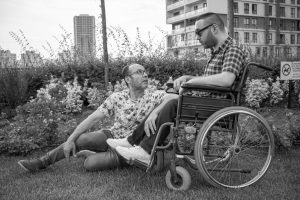For centuries, trans*, queer, and disabled communities have found a sense of comfort, care, and compassion through the forming of a “chosen family.” While TV shows like The L Word show us the appeal of chosen family, we are never explicitly taught how to build an affirming sense of what Adlerian psychologists call “gemeinschaftsgefühl” or community feeling. As a result, many of us feel a lack of close relationships in our lives. Though unicorn balls and friend-finding apps have encouraged us to connect and gather, many of us still feel isolated from those who get us and our loneliness grows amidst tech-driven isolation, global uncertainty, and political unrest. There aren’t many supports available to combat this unsettling trend, and so we’re tasked with the big quest of finding each other and connecting in safe and comfortable ways.
This week’s blog post is a part of the four-week chosen family series, and it aims to explore how to find your chosen family. Read on to learn how to build trans*, queer, and disability resiliency through the formation of meaningful connections.
First, what is a chosen family? Whether you’re just coming out or you and your partner(s) are thinking about starting a family, chosen family is a part of the trans*, queer, and/or disability experience. It has your back and supports you through hard times. It’s collective healing and mutual aid. It can ethically distribute the shared responsibility of care. It lifts you up when you’re down. It shares a meal with each other on a Sunday afternoon. It goes camping with close friends. It’s sharing groceries when your friend is unwell. It’s a casual alternative to group therapy. For many of us, it’s a means of survival.
Chosen family is essential at any age or stage of life. Young LGBTQ+ people turn to their chosen families for social support, identity affirmation, stable housing, and practical help after their families of origin have rejected them. LGBTQ+ adults rely on their chosen family to offset the feelings of isolation when planning a family, dealing with postpartum depression, and raising kids in cishet-dominant neighborhoods. Older LGBTQ+ adults rely on their chosen family to provide feedback and social support during empty nesting, dealing with chronic pain, planning for retirement, downsizing, and aging. Disabled folx rely on their chosen family for the same reasons, and also to create and bolster a circle of essential care for each other.
The first step in finding your chosen family is to explore how you’d like to be supported and then name what you need.
The following questions can help you to complete this first step. Consider the following: How do you define community? Do you want your chosen family to boost your mood or be present through the ups and downs? What does reciprocal connection look like or feel like to you? When you think about your ideal chosen family, what do you see when you imagine them? What support roles are important in your chosen family? Do you need help? If so, how much and how often?
Once you identify your needs and imagine the ideal characteristics of your chosen family, it may be time to reach out.
First, revisit your needs and then explore whom you may count on to satisfy each need. For example, if you desire to find your chosen family within a spiritual community, consider attending trans* and queer gathering places that centre spirituality, such as Vancouver Unitarians or, perhaps, Qmunity’s Rainbow Light Meditation. If you hope to find your chosen family among sports enthusiasts, consider joining Double Rainbow Dodgeball, Queer Box Camp, or Van Queer Climbers.
Don’t rule out peer support groups because there you’ll find people working through a common shared experience.
Peer support groups like Qmunity’s wide range of volunteer-run groups, including Aces and Aros Social and Support Group, Authentically Other, Autistic Queer Peers, BiFocus Vancouver, Gloriously Queer, Latidos Latines, Queer Love, Queer Love in Colour, Rainbow Light Meditation, Transgathering, Transgathering Medical, and WalkOUT can be a highly interactive way to get down to the nitty-gritty of what’s on your mind and connect with others on a similar path that reflects your own journey.
Many find community through Discord or similar chat apps, so you may want to try connecting with Pink, White & Brew.
Reminder: Building a chosen family takes time, so this is a long game. Go at it steadily, and keep it small at first.
You may start with one or two people that you’d like to get to know. Consider how you’ve gotten to know your friends in the past. What worked well? What didn’t go so well? Think about what you can do to explore friendship with each of them. Maybe you can meet for coffee or connect virtually if meeting in person isn’t possible for either of you.
As you begin to strengthen friendships and other relationships that matter to you, consider how you may broaden your efforts to build out your chosen family. This is time to think about people you’d like to get to know. Make a list, and reach out to each of them. As you do so, think about how you’d like these connections to deepen or change.
Once you find a good fit for your squad, have a good time together and purposefully plan ways to keep in touch.
The COVID-19 pandemic continues, and it disproportionately affects persons with disabilities and chronic illnesses. It also disproportionately affects LGBTQ youth and the sustainability of chosen families. If you’re having a hard time figuring out how to stay connected, consider alternatives to meeting face-to-face, such as hosting a virtual karaoke night with friends, writing a letter or sending a postcard, logging onto a Zoom call to make art or craft together, hanging out at a park or outside place with lots of open space and fresh air, hosting a virtual game night, or getting online to do an activity together.
Be easeful with this slow process and be gentle with yourself as you explore ways to build your chosen family.
In conclusion, finding a chosen family can be a transformative and empowering experience. Whether you’re seeking support, love, or simply a sense of belonging, there are many ways to build meaningful connections with people who share your values and interests. By exploring different communities, volunteering, attending events, and reaching out to others, you can create a support system that uplifts you and helps you thrive. Remember that building a chosen family takes time, effort, and vulnerability, but the rewards are immeasurable. So don’t be afraid to take the first step and reach out to those around you – you might be surprised at the depth of connection that awaits.
Disclaimer: This blog offers general educational information and does not constitute professional advice or establish a therapist-client relationship. Please consult a healthcare provider for personalized guidance. Any decisions based on the content are the reader’s responsibility, and Clayre Sessoms Psychotherapy assumes no liability. All case studies are hypothetical with fictional names and do not reflect actual people. We prioritize your privacy and the confidentiality of all of our clients. We are committed to maintaining a safe, supportive space for 2SLGBTQIA+ community care.




